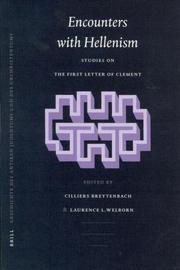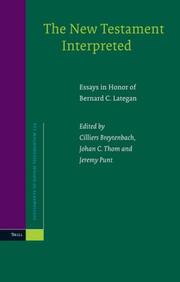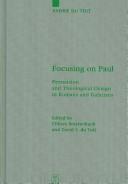| Listing 1 - 8 of 8 |
Sort by
|
Book
ISBN: 128311965X 9786613119650 9004188045 9789004188044 9789004186088 9004186085 6613119652 Year: 2010 Volume: 135 Publisher: Leiden Boston Brill
Abstract | Keywords | Export | Availability | Bookmark
 Loading...
Loading...Choose an application
- Reference Manager
- EndNote
- RefWorks (Direct export to RefWorks)
How did the first Christians interpret the death of Christ? The answer lies within the earliest Christian documents, primarily within the Pauline letters. Before the users of a modern language could hope to come near an adequate description of what was expressed in these Greek texts of the first Christians, they have to deconstruct layers of later dogmatic interpretation. They need to keep to descriptive terminology reflecting the Greek of the sources and to trace the origin of the metaphoric language early Christians like Paul used. This volume sets out to construct some of the Jewish and Greco-Roman patterns of thought which were initially utilised to express the meaning of the death of Christ.
Bible. N.T. Epistles of Paul -- Theology. --- Civilization, Greco-Roman. --- Jesus Christ - Crucifixion. --- Jesus Christ -- Crucifixion. --- Metaphor - Religious aspects - Christianity. --- Metaphor -- Religious aspects -- Christianity. --- Metaphor --- Civilization, Greco-Roman --- Religion --- Philosophy & Religion --- Christianity --- Religious aspects --- Christianity. --- Jesus Christ --- Crucifixion. --- Bible. --- Theology. --- Greco-Roman civilization --- Christ --- Cristo --- Jezus Chrystus --- Jesus Cristo --- Jesus, --- Jezus --- Christ, Jesus --- Yeh-su --- Masīḥ --- Khristos --- Gesù --- Christo --- Yeshua --- Chrystus --- Gesú Cristo --- Ježíš --- Isa, --- Nabi Isa --- Isa Al-Masih --- Al-Masih, Isa --- Masih, Isa Al --- -Jesus, --- Jesucristo --- Yesu --- Yeh-su Chi-tu --- Iēsous --- Iēsous Christos --- Iēsous, --- Kʻristos --- Hisus Kʻristos --- Christos --- Jesuo --- Yeshuʻa ben Yosef --- Yeshua ben Yoseph --- Iisus --- Iisus Khristos --- Jeschua ben Joseph --- Ieso Kriʻste --- Yesus --- Kristus --- ישו --- ישו הנוצרי --- ישו הנצרי --- ישוע --- ישוע בן יוסף --- المسيح --- مسيح --- يسوع المسيح --- 耶稣 --- 耶稣基督 --- 예수그리스도 --- Jíizis --- Yéshoua --- Iėsu̇s --- Khrist Iėsu̇s --- عيسىٰ --- Epistles of Paul --- Paul, Epistles of --- Paul Sŏsin --- Pauline epistles --- Risālat al-Qiddīs Būlus al-rasūl al-thāniyah ilá Tīmūthīʼūs --- Civilization, Classical --- عيسىٰ --- 225*6 --- Parabole --- Figures of speech --- Reification --- 225*6 Graflegging van Jezus. Lege graf. Verrijzenis en verheerlijking van Jezus --- Graflegging van Jezus. Lege graf. Verrijzenis en verheerlijking van Jezus --- Religious aspects&delete& --- Métaphore --- Civilisation gréco-romaine --- Aspect religieux --- Christianisme
Book
ISBN: 9789004390188 9004390189 9789004392274 9004392270 Year: 2019 Volume: 174 Publisher: Leiden Boston
Abstract | Keywords | Export | Availability | Bookmark
 Loading...
Loading...Choose an application
- Reference Manager
- EndNote
- RefWorks (Direct export to RefWorks)
The chapters in this volume cover all aspects of the work of Adolf Deissmann (1866–1937). Following his main works, the authors highlight crucial aspects and impulses from his philological work on the New Testament, including the interpretation of Paul, Light from the Ancient East, the social status of the first Christians, and the lexicography of the New Testament. His background in the Lutheran Church of Hessen-Nassau, his contribution to the ecumenical movement together with Nathan Söderblom and through the Evangelische Wochenbriefe during World War II, and his role as rector of the Berlin University in 1930/1931 are also discussed. The contributions illustrate that notwithstanding his ecumenical engagement, Deissmann never gave up his scholarly work. The essays trace the influence of his philological and historical work among his students and place contemporary debates on Deissmann as philologist and theologian in their historical context. Dieser Band widmet sich in neun Einzelbeiträgen der gesamten Breite des Schaffens von Adolf Deissmann (1866–1937). Entlang der Hauptwerken werden wesentliche Aspekte und Impulse aus seiner philologisch orientierten Arbeit am Neuen Testament neu gewürdigt (Interpretation der Paulusbriefe, Licht vom Osten , „Unterschichtenthese“, neutestamentliche Lexikographie et cetera). Daneben geht es um seine Herkunft aus der Evangelischen Kirche in Hessen-Nassau, um sein Wirken in der Ökumene am Beispiel der Beziehung zu Nathan Söderblom und der Arbeit an den Evangelischen Wochenbriefen im Ersten Weltkrieg sowie um seine Rolle als Rektor der Berliner Universität von 1930 bis 1931. Die Beiträge zeigen, dass Deissmann trotz seines ökumenischen Engagements seine wissenschaftliche Arbeit nicht aufgegeben hat. Die Aufsätze gehen den Wirkungen seiner philologisch-historischen Arbeit unter seinen Schülern nach und stellen die zeitgenössischen Debatten um den Philologen und Theologen Deissmann in ihren historischen Kontext.
Theologens --- Philologists --- Deissmann, Adolf, --- Theologians --- Théologiens --- Philologues --- Biography. --- Biographie --- Theology --- 225.02*3 --- 261.8*80 --- 261.8*80 Oecumenische theologie: kerkgeschiedenis --- Oecumenische theologie: kerkgeschiedenis --- 225.02*3 Nieuw Testament: Griekse bijbelse filologie --- Nieuw Testament: Griekse bijbelse filologie --- Philologians --- Scholars --- Linguists --- Christian theologians --- Christian theology --- Theology, Christian --- Christianity --- Religion --- History --- Söderblom, Nathan, --- Söderblom, Lars Olof Jonathan, --- Soederblom, Nathan, --- Festschrift - Libri Amicorum --- Theologens - Germany - Biography --- Philologists - Germany - Biography --- Deissmann, Adolf, - 1866-1937

ISSN: 0169734X ISBN: 9004125264 9786610466689 1423710983 1280466685 9047401441 9789004125261 9781423710981 9789047401445 Year: 2004 Volume: 53 Publisher: Leiden Boston Brill
Abstract | Keywords | Export | Availability | Bookmark
 Loading...
Loading...Choose an application
- Reference Manager
- EndNote
- RefWorks (Direct export to RefWorks)
This volume deals with the encounter of Early Christianity with Hellenistic culture, particularly with the question of ancient rhetorical influence on the First Letter of Clement. It contains reprints of two classical studies by A. von Harnack and W. Jaeger, which were seminal for the understanding the letter against a Hellenistic background, furthermore it makes an important essay of the Dutch scholar W.C. van Unnik on the literary and rhetorical genre of First Clement ( genos symbouleutikon ) for the first time available in English. The editors also present two new studies: Breytenbach describes the Hellenistic background of Clement's use of metaphorical language and Welborn questions the traditional dating of First Clement on the basis of an analysis of the rhetorical situation.
Christianity and culture --- History --- Clement --- 276 =75 CLEMENS I ROMANUS --- 225.08*9 --- -225.08*9 Theologie van het Nieuw Testament: relatie met het hellenisme --- Theologie van het Nieuw Testament: relatie met het hellenisme --- Contextualization (Christian theology) --- Culture and Christianity --- Inculturation (Christian theology) --- Indigenization (Christian theology) --- Culture --- Griekse patrologie--CLEMENS I ROMANUS --- -Clement I, Pope --- 225.08*9 Theologie van het Nieuw Testament: relatie met het hellenisme --- Clement I --- Primitive and early church, ca. 30-600 A.D. --- Christianity and culture - History - Early church, ca 30-600 --- Clement - I, - Pope. - First epistle of Clement to the Corinthians.

ISBN: 9004153047 9789004153042 9786611400279 1281400270 9047410599 9789047410591 Year: 2007 Volume: 124 Publisher: Leiden Boston Brill
Abstract | Keywords | Export | Availability | Bookmark
 Loading...
Loading...Choose an application
- Reference Manager
- EndNote
- RefWorks (Direct export to RefWorks)
This volume contains a collection of essays in honour of Bernard C. Lategan, a renowned specialist on the modern reception of the New Testament. Besides offering anayses of Lategan’s own contribution to New Testament scholarship, the essays present and discuss interpretations of the New Testament from antiquity through contemporary critical scholarship. Topics covered include hermeneutical issues of historical Jesus research, intertextuality in antiquity, the interpretation of the New Testament in Africa, and the New Testament as literature. The collection thus provides a representative perspective on the diversity of New Testament scholarship in South Africa and elsewhere.
Lategan, Bernard C. --- Bible. --- Criticism, interpretation, etc. --- Congresses. --- Bible --- Criticism, interpretation, etc --- 225.06 --- 225 <082> --- Nieuw Testament: exegese; hermeneutiek--(theorie en methoden) --- Bijbel: Nieuw Testament--Feestbundels. Festschriften --- Ba-yon Tipan --- Bagong Tipan --- Jaji ma Hungi --- Kainē Diathēkē --- New Testament --- Nouveau Testament --- Novo Testamento --- Novum Testamentum --- Novyĭ Zavet --- Novyĭ Zavi︠e︡t Gospoda nashego Īisusa Khrista --- Novyĭ Zavit --- Nuevo Testamento --- Nuovo Testamento --- Nye Testamente --- Perjanjian Baru --- Dhamma sacʻ kyamʻʺ --- Injīl --- Festschrift - Libri Amicorum --- 225.06 Nieuw Testament: exegese; hermeneutiek--(theorie en methoden) --- Kainē Diathēk --- Novyĭ Zavi͡et Gospoda nashego Īisusa Khrista

ISBN: 9783110195125 3110195127 3110914557 9783110914559 Year: 2012 Volume: 151 Publisher: Berlin Boston
Abstract | Keywords | Export | Availability | Bookmark
 Loading...
Loading...Choose an application
- Reference Manager
- EndNote
- RefWorks (Direct export to RefWorks)
In the early 1970's, due to serious epistemological flaws, the demise of traditional New Testament research paradigms became imminent. A new generation of scholars started the search for a fresh approach, based on scientifically sound principles. Working within the stimulating atmosphere of the New Testament Society of South Africa, the author was one of the pioneers in developing a new, multi-dimensional research approach for New Testament studies. The articles in the present volume, written over a period of 25 years, reflect part of this journey, as viewed from a Pauline perspective. Combining the positive aspects of the traditional biblical research paradigms with the important insights of modern linguistics, literary science, semantics and pragmatics, particularly rhetoric, the author investigates the convergence of various influences in Paul's pre-christian career. He proposes new possibilities of understanding Paul's language and style, such as hyperbolical contrasts, typical of his Semitic background. Various aspects of his strategies of persuasion are investigated, such as creating an ethos, vilification, alienation and re-identification. The majority of articles concentrate on central elements in Pauline theology: belief in the resurrection of Jesus, the centrality of grace, the in Christ and related formulae, faith and obedience, justification in Romans, Christian identity, ethics and ethos, as portrayed in Romans.
Du Toit, A B --- Bible. --- Bible --- Theology --- Criticism, interpretation, etc --- 227.08 --- Paulinische theologie --- 227.08 Paulinische theologie --- Du Toit, A. B. --- Du Toit, Andreas B. --- Toit, A. B. du --- Du Toit, Andrie --- Toit, Andrie du --- Du Toit, Andries Bernhardus --- Epître aux Romains (Book of the New Testament) --- List do Rzymian (Book of the New Testament) --- Roma-sŏ --- Római levél --- Romans (Book of the New Testament) --- Romasŏ --- Brief aan die Galasiërs --- Epistle to the Galatians (Book of the New Testament) --- Galasiërs --- Galatians (Book of the New Testament) --- Galladia --- Galladia-sŏ --- Galladiasŏ --- Garateya sho --- Kalladiasŏ --- Epistles of Paul --- Paul, Epistles of --- Paul Sŏsin --- Pauline epistles --- Risālat al-Qiddīs Būlus al-rasūl al-thāniyah ilá Tīmūthīʼūs --- Theology. --- Criticism, interpretation, etc. --- Rhetoric in the Bible. --- Du Toit, A B - (Andreas B) - Bibliography --- Background of Paul. --- Pauline rhetoric. --- Paul’s language. --- Romans. --- Theology of Paul. --- Du Toit, A B - (Andreas B)
Book

ISBN: 9783110533705 3110533707 9783110533781 9783110533729 Year: 2018 Volume: 234 Publisher: Berlin Boston
Abstract | Keywords | Export | Availability | Bookmark
 Loading...
Loading...Choose an application
- Reference Manager
- EndNote
- RefWorks (Direct export to RefWorks)
The volume deals with interpretations of Paul, his person and his letters, in various early Christian writings. Some of those, written in the name of Paul, became part of the New Testament, others are included among „Ancient Christian Apocrypha", still others belong to the collection called „The Apostolic Fathers". Impacts of Paul are also discernible in early collections of his letters which became an important part of the New Testament canon. This process, resulting in the „canonical Paul", is also considered in this collection.
Church history --- 227*0 --- 227.08 --- 227.1 --- Apostolic Church --- Christianity --- Church, Apostolic --- Early Christianity --- Early church --- Primitive and early church --- Primitive Christianity --- Fathers of the church --- Great Apostasy (Mormon doctrine) --- 227.1 Brieven van Paulus--(algemeen) --- Brieven van Paulus--(algemeen) --- 227.08 Paulinische theologie --- Paulinische theologie --- 227*0 Leven van Paulus --- Leven van Paulus --- Paul, --- Pavel, --- Pavol, --- Paulus, --- Paulos, --- Pōghos, --- Paweł, --- Pawełm --- Būlus, --- Pablo, --- Paulo, --- Paolo, --- Pál, --- Apostolos Paulos --- Saul, --- القديس بولس الرسول --- بولس، --- 사도바울 --- Bible --- Criticism, interpretation, etc. --- History.
Book

ISBN: 9783110373998 Year: 2014 Publisher: Berlin Boston
Abstract | Keywords | Export | Availability | Bookmark
 Loading...
Loading...Choose an application
- Reference Manager
- EndNote
- RefWorks (Direct export to RefWorks)
Book

ISBN: 9783110893939 Year: 2012 Publisher: Berlin Boston
Abstract | Keywords | Export | Availability | Bookmark
 Loading...
Loading...Choose an application
- Reference Manager
- EndNote
- RefWorks (Direct export to RefWorks)
| Listing 1 - 8 of 8 |
Sort by
|

 Search
Search Feedback
Feedback About UniCat
About UniCat  Help
Help News
News